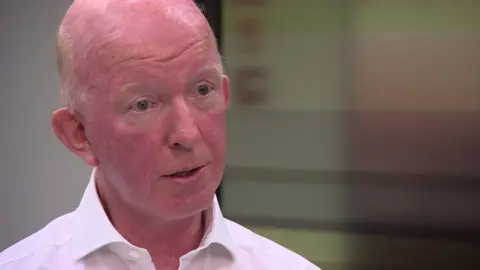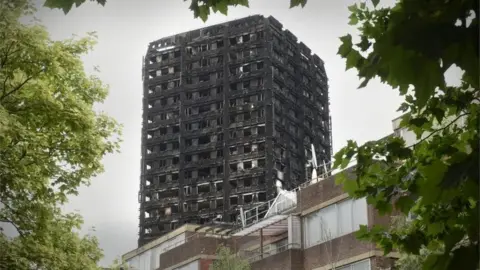Grenfell Tower fire: Kensington council halts meeting
 BBC
BBCKensington and Chelsea Council's cabinet has adjourned its first meeting since the Grenfell Tower tragedy after just twenty minutes.
The cabinet had hoped to hold the meeting behind closed doors - but was forced by a court order to admit the press and public at 18:30 BST.
The council adjourned the meeting soon after, claiming it would "prejudice" the forthcoming public inquiry.
Earlier the council's leader apologised to the survivors of Grenfell Tower.
But Nicholas Paget-Brown, a Conservative councillor, told BBC London he would not resign in the foreseeable future.
He also rejected claims the tragedy showed the authority had failed the community.
London Mayor Sadiq Khan has called for the entire leadership of the council to resign after the tragedy.
The mayor also said the disaster was the result of "years of neglect".
But so far the only person to resign has been the chief executive of Kensington and Chelsea council, Nicholas Holgate.

Mr Paget-Brown said the Grenfell Tower fire was "the biggest tragedy to hit London since the end of the Second World War".
He said he had not apologised directly to a survivor but said he needed "to apologise if the response on the ground to the tragedy has not been quick enough or not appropriate enough or on the scale that is needed".
"I do apologise here and to you and if anybody feels that Kensington and Chelsea should have been doing more, we've been trying to do all that we possibly can."

Analysis by Tim Donovan, BBC London Political Editor
It's been a catastrophe and a challenge which no council leader would ever want to face.
For Nicholas Paget-Brown, the task has become harder given the original perception.
Not just that the authority couldn't cope, but that it didn't know how to muster quickly the support which would have helped.
He's been on the back-foot since.
There will be lessons, which he says he is as keen as anyone should emerge from the public enquiry.
He says it's not the right time to be talking about issues like whether he should resign, nor answer in detail the criticisms that his policies failed, nor that a community was neglected.
He gives the impression he will want to, in time.
For the moment, the prime task is to restore confidence and reputation.

Asked why the council did not ask for help from outside the borough or from the government more quickly, the Mr Paget-Brown said: "We did do that quite quickly.
"We had gold meetings, which is the sort of centralised command meetings, twice on the Wednesday so we could see what we had locally and what me might need [from] elsewhere .
"Then the London gold command came in shortly after that and we've had to work both with the borough and the London gold command.
"We let it known that we needed help quite early in the proceedings. I can't tell you exactly at what time of the day but it became quite clear that we would not be able to cope on our own.
"On the morning of Wednesday I believe the Cabinet Office met in Cobra and we had a gold session in the council here and I think we worked quite closely to make sure that all the different parties, all the different partners that you need were able to help as quickly as possible."
In a statement released after the cabinet meeting was adjourned, Mr Paget-Brown said: "We are under sustained media criticism for a slow reaction to the fire, non-visibility and for failing to invest in North Kensington.
"I believe that many of these criticisms need to be challenged and over time they will be, but I can think of nothing more demeaning to the memory of those lost and missing in the fire than seeking the resolution of political scores."
